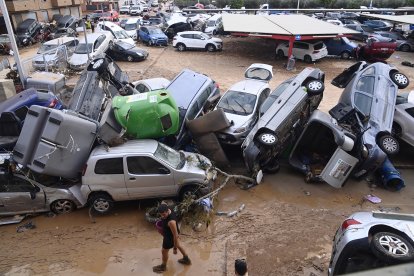Spain: Torrential rains hit Malaga and Tarragona two weeks after Valencia disaster
Spanish weather authorities have issued red alerts in two areas, in addition to a number of orange warnings on the east, south and northwest coast.

Floods and material damage in Spain due to last October storm
Thousands of people were evacuated and train services have been suspended as torrential rains returned to Spain on Wednesday, just two weeks after devastating floods that claimed at least 223 lives, most of them in the Valencia region.
Spain's national meteorological agency (Aemet) issued the highest level of alert, red, for the Andalusian province of Málaga in the south and the province of Tarragona in the northeast, due to the new DANA (isolated depression at high levels), or cold drop, as the phenomenon is known.
The city of Málaga appears to be the most affected by the rains, with over 3,000 people evacuated from 1,000 homes near the rivers, flooded streets, and the suspension of both urban transport and rail services to Madrid.
"Today Malaga is paralyzed," the regional president of Andalusia, Juan Manuel Moreno, told reporters. "I know that for citizens it is a problem not being able to take the children to class or go to work, but after what we saw in Valencia we must prevent and minimize the impact in terms of loss of human lives," he added.
The storm forced the postponement of Friday’s playoff match between Spain and Poland in the Billie Jean King Cup women's tennis competition, which was originally scheduled to take place on Wednesday afternoon in Málaga.
A DANA is an air mass that detaches from a cold air current and descends into a layer of warmer air, creating significant atmospheric disturbances and heavy precipitation.
"We don't have much to lose"
In the areas under red alert, near the coast, rainfall could accumulate between 5-7 inches (120 to 180 mm), according to Aemet. The precipitation is expected to last until Friday.
Although less intense, rain was also expected in the areas of Valencia affected by the floods of October 29, raising fears of sewage overflows due to hardened mud. Meanwhile, residents were resigning themselves, struggling to imagine how the situation could worsen further.
Carlos Moltó, a resident of Picanya, told the Valencian regional television station A Punt, "We've already lost the cars, we've already lost most of the house, and the jobs we don't have either. So, there's nothing to lose anymore, we don't have much to lose."
After a titanic effort to clear the streets, the municipality of Paiporta was once again flooded, according to local newspaper Las Provincias.
The floods two weeks ago damaged the doors of many ground-level homes, prompting residents to set up barricades made of planks or sacks of earth in front of their properties.
Several municipalities in Valencia asked the thousands of volunteers who come to assist in the streets each day to refrain from coming on Wednesday.
The new rains hindered the search for the 17 missing people, which was primarily focused on ravines and river mouths leading to the sea.
"The search by sea has been compromised as a result of the maritime storm," Rosa Tourís, spokeswoman for the Emergency Committee of Valencia, told reporters. "After this meteorological episode, the tides are re-evaluated to determine the search areas."
Alert message
Authorities in Andalusia and Catalonia, both under red alert, anticipated the effects of the rains and issued advance warning messages to cell phones.
"Be very cautious, avoid travel, and follow the advice of emergency services," read the message sent in Málaga, which was accompanied by a loud beep upon receipt.
Aemet's red alert, in effect this Wednesday, warns of "extreme" danger due to "unusual meteorological phenomena of exceptional intensity, posing a very high risk to the population."
The threat of heavy rain prompted authorities to suspend classes in parts of southern Catalonia and in Andalusian cities like Granada.
The storm generated coastal waves over four meters high, caused road closures, disrupted rail services, and led to the closure of the ports of Valencia and Sagunto to maritime traffic.
RECOMMENDATION





















